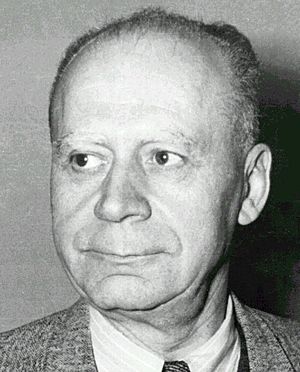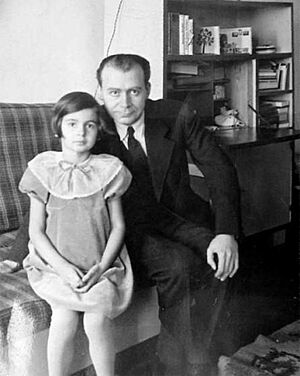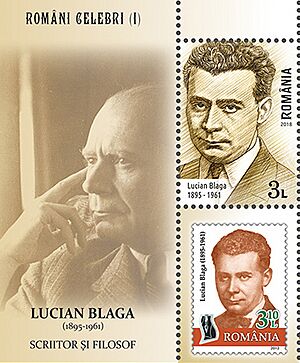Lucian Blaga facts for kids
Quick facts for kids
Lucian Blaga
|
|
|---|---|

Blaga's portrait, Museum of the Romanian Peasant
|
|
| Born | 9 May 1895 |
| Died | 6 May 1961 (aged 65) |
| Resting place | Lancrăm, Sebeș Municipality, Alba County, Romania |
| Alma mater | University of Vienna |
| Occupation | linguist, poet, translator, philosopher, writer, journalist, diplomat |
|
Notable work
|
Poems of light |
| Political party | National Christian Party |
| Movement | |
| Spouse(s) | Cornelia Brediceanu |
| Children | Ionel Blaga, Dorli Blaga |
| Parents |
|
| Awards | Hamagiu Award (1935) |
Lucian Blaga (born May 9, 1895 – died May 6, 1961) was a famous Romanian thinker, poet, and writer. He also wrote plays and translated poetry. He is known for his original ideas and was a university professor and a diplomat.
Contents
About Lucian Blaga
Lucian Blaga was a very important person in Romanian culture, especially between the two World Wars. He was highly respected for his ideas and writings. Even today, a theater in Cluj is named after him, and his picture has been on Romanian banknotes.
He was born on May 9, 1895, in a village called Lámkerék (now Lancrăm). His father was an Orthodox priest. Blaga later wrote that his early childhood felt like it was "under the sign of the incredible absence of the word," meaning he was very quiet as a child.
His Education and Early Career
He went to elementary school in Szászsebes (now Sebeș) from 1902 to 1906. Then, he attended high school in Brassó (now Brașov) from 1906 to 1914. His uncle, Iosif Blaga, who wrote the first Romanian book on drama theory, looked after him.
When World War I started, Lucian Blaga began studying theology in Nagyszeben (now Sibiu). He finished these studies in 1917. He published his first article about philosophy during this time. From 1917 to 1920, he studied philosophy at the University of Vienna and earned his PhD degree.
After returning to Transylvania, which was then part of Romania, he worked as an editor for magazines. He worked for Culture in Cluj and The Banat in Lugoj.
Diplomacy and Academia
In 1926, Blaga started working as a diplomat for Romania. This meant he represented his country in other nations. He worked in cities like Warsaw, Prague, Lisbon, Bern, and Vienna. He was related to the wife of Octavian Goga, a famous poet who was briefly a prime minister.
In 1936, he became a member of the Romanian Academy, a very respected group of scholars and artists. His speech for this honor was called In Praise of the Romanian Village.
In 1939, he became a professor of cultural philosophy at the University of Cluj. This university was temporarily located in Sibiu because of the Second Vienna Award. While in Sibiu, he started editing a yearly magazine called Saeculum in 1943.
Challenges and Later Life
In 1948, he lost his job as a university professor. This happened because he refused to support the new Communist government in Romania. After that, he worked as a librarian in Cluj. He was not allowed to publish his own new books until 1960. During this time, he focused on translating other works. He completed a translation of Faust, a famous play by the German writer Goethe.
In 1956, Lucian Blaga was suggested for the Nobel Prize in Literature. However, the Romanian Communist government sent people to Sweden to protest this idea. They saw Blaga as an "idealist philosopher," and his poems were not allowed to be published until 1962.
Lucian Blaga was diagnosed with cancer and passed away on May 6, 1961. He was buried on his birthday, May 9, in his home village of Lancrăm, Romania.
He was married to Cornelia Brediceanu. They had one daughter named Dorli. Her name comes from the Romanian word dor, which means a feeling of "longing" or "yearning."
Today, the University of Sibiu is named after him to honor his contributions.
His Writings
Lucian Blaga wrote many different types of works, including poetry, plays, and philosophical books.
Poetry Collections
- 1919 – Poems of Light (Poemele luminii)
- 1921 – The Prophet's Footsteps (Pașii profetului)
- 1924 – In the Great Passage (În marea trecere)
- 1929 – In Praise of Sleep (Laudă somnului)
- 1933 – At the Watershed (La cumpăna apelor)
- 1938 – At the Courtyard of Yearning (La curțile dorului)
- 1943 – Unsuspected Steps (Nebănuitele trepte)
- 1982 – 3 Posthumous Poems (published after his death)
Plays (Drama)
- 1921 – Zamolxis, a Pagan Mystery
- 1923 – Whirling Waters
- 1925 – Daria, The Deed, Resurrection
- 1927 – Manole the Craftsman (Mesterul Manole)
- 1930 – The Children's Crusade
- 1934 – Avram Iancu
- 1944 – Noah's Ark
- 1964 – Anton Pann (published after his death)
His Philosophy
Lucian Blaga's philosophical work is organized into four main groups, called trilogies. Each trilogy explores different big ideas:
- Filosofia cunoașterii (Philosophy of Knowledge) (1943)
- Filosofia culturii (Philosophy of Culture) (1944)
- Filosofia valorilor (Philosophy of Values) (1946)
- Filosofia cosmologică (Cosmological Philosophy) (1983, published after his death)
The fourth trilogy, Cosmologica, was finished but not published during his lifetime because of government censorship. Before he died, Blaga left instructions for how his works should be published later.
His novel Charon's Ferry is like a companion to his philosophical trilogies. In it, he explores difficult philosophical questions through a fictional philosopher.
Important Philosophical Works
- 1924 - "The Philosophy of Style"
- 1925 - "The Original Phenomenon" and "The Facets of a Century"
- 1931 - "The Dogmatic Aeon"
- 1933 - "Luciferian Knowledge"
- 1934 - "Transcendental Censorship"
- 1936 – "Horizon and Style" and "The Mioritic Space"
- 1937 – "The Genesis of Metaphor and the Meaning of Culture"
- 1939 – "Art and Value"
- 1940 – "The Divine Differentials"
- 1942 – "Religion and Spirit" and "Science and Creation"
- 1943 – The Trilogy of Knowledge
- 1944 – The Trilogy of Culture
- 1946 – The Trilogy of Values
- 1959 – Historical Existence
- 1966 – Romanian Thought in Transylvania in the 18th Century
- 1968 – Horizons and Stages
- 1969 – Experiment and the Mathematical Spirit
- 1972 – Sources (a collection of essays, lectures, and articles)
- 1974 – On Philosophical Cognition
- 1977 – Philosophical Essays
- 1983 – The Cosmological Trilogy
Other Writings
- 1919 – Stones for My Temple, a book of short, wise sayings (aphorisms)
- 1945 – Discoblus, more aphorisms
- 1965 – The Chronicle and Song of Ages, his memoirs (stories from his life)
- 1977 – The Élan of the Island, aphorisms
- 1990 – Charon's Ferry, a novel
His Works in English
Many of Lucian Blaga's works have been translated and included in English poetry collections:
- Born in Utopia - An anthology of Modern and Contemporary Romanian Poetry (2006)
- Testament – Anthology of Modern Romanian Verse (Bilingual Edition English & Romanian) (2012 and 2015)
- Testament - Anthology of Romanian Verse - American Edition (2017)
- Testament - 400 Years of Romanian Poetry (bilingual edition) (2019)
- Romanian Poetry from its Origins to the Present (bilingual edition English/Romanian) (2020)
See also
 In Spanish: Lucian Blaga para niños
In Spanish: Lucian Blaga para niños
 | Frances Mary Albrier |
 | Whitney Young |
 | Muhammad Ali |



